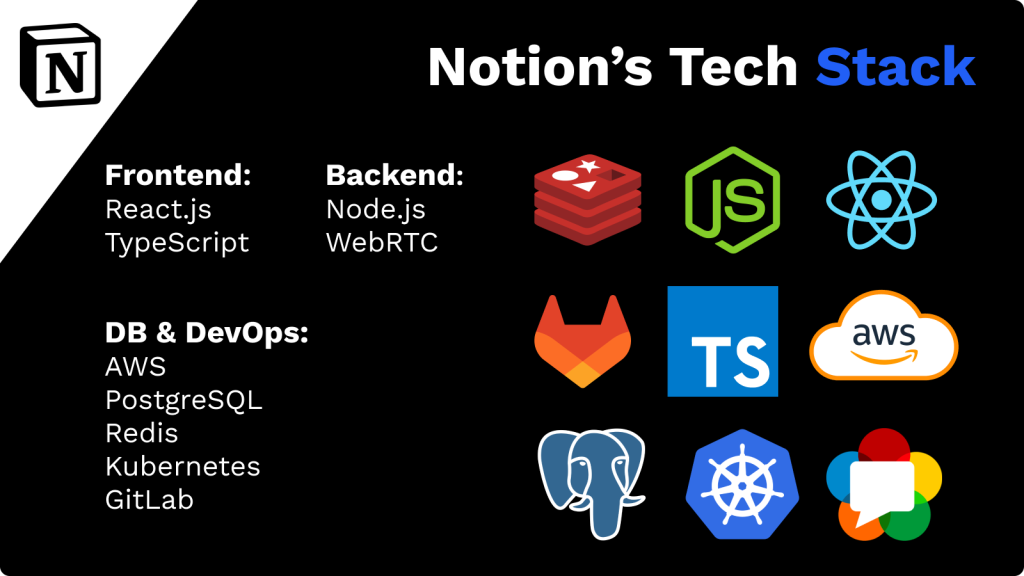Software Services
For Companies
For Developers
Products
Portfolio
Build With Us
Build With Us
Get Senior Engineers Straight To Your Inbox

Every month we send out our top new engineers in our network who are looking for work, be the first to get informed when top engineers become available

At Slashdev, we connect top-tier software engineers with innovative companies. Our network includes the most talented developers worldwide, carefully vetted to ensure exceptional quality and reliability.
Build With Us
Breaking Down Notion’s Tech Stack/

Learn more about how Notion built their product and the tech stack they use to power one of the best task management apps on the market. Notion is a powerful and versatile productivity and collaboration platform that has gained widespread recognition as a “super app” for task management, note-taking, and knowledge sharing. With its expansive array of features, intuitive user interface, and customizable components, Notion has captured the attention of individuals, startups, and large enterprises alike. It seamlessly integrates various functionalities, such as databases, wikis, Kanban boards, calendars, and rich-text editing, providing users with a unified workspace to organize, track, and collaborate on projects.

Notion’s flexibility stems from its unique block-based structure, which allows users to mix and match content types, such as text, images, videos, tables, and embedded files, to create tailor-made pages that suit their specific needs. This adaptability has made Notion a popular choice among teams and individuals across diverse industries, who rely on it to manage tasks, create internal knowledge bases, plan and execute projects, and collaborate in real-time.
In addition to its robust core functionalities, Notion also offers a range of integrations with popular third-party services, such as Google Drive, Slack, and GitHub, further enhancing its capabilities and enabling seamless workflows. With its innovative approach to productivity and collaboration, Notion has established itself as a game-changing tool that empowers users to streamline their work processes and achieve their goals more efficiently.
Background
Frontend
- React: Notion’s user interface is built using the React JavaScript library, which enables the creation of reusable UI components and a responsive user experience.
- Redux: Redux is used for state management in Notion’s frontend, helping to manage the application state and interactions between components.
- TypeScript: Notion leverages TypeScript, a statically-typed superset of JavaScript, to ensure type safety and better developer experience.
- Webpack: Notion uses Webpack for bundling and optimizing frontend assets, improving the application’s performance.
Backend
- Node.js: Notion’s backend services are built on Node.js, a JavaScript runtime environment that allows for efficient and scalable server-side applications.
- Express.js: Express is a minimalist web framework for Node.js used to build Notion’s API endpoints and handle server-side routing.
- PostgreSQL: Notion uses PostgreSQL as its primary database for storing and managing user data, ensuring reliability and performance.
- Redis: Redis, an in-memory data structure store, is employed as a caching layer to speed up common operations and reduce the load on the primary database.
- WebRTC: WebRTC (Web Real-Time Communication) is an open-source project and set of protocols that enables real-time communication between web browsers and applications. It allows for direct peer-to-peer communication, which can be used to transmit audio, video, and data across the internet without the need for plugins or third-party software. WebRTC is supported by most modern web browsers, including Google Chrome, Mozilla Firefox, Safari, and Microsoft Edge.
Infrastructure & Deployment
- AWS (Amazon Web Services): Notion relies on various AWS services for hosting, storage, and server management. Services like EC2, S3, and RDS are some of the key components in their infrastructure.
- Docker: Notion uses Docker containers to package and distribute their applications, ensuring consistent environments and easy deployment.
- Kubernetes: To manage and orchestrate their Docker containers, Notion utilizes Kubernetes, an open-source container orchestration platform.
Version Control & Collaboration
- Git: Notion employs Git as its version control system, allowing developers to track changes in their codebase and collaborate effectively.
- GitLab: Notion uses GitLab as the platform for hosting and managing their Git repositories, taking advantage of its collaboration features and integrations with other tools.

